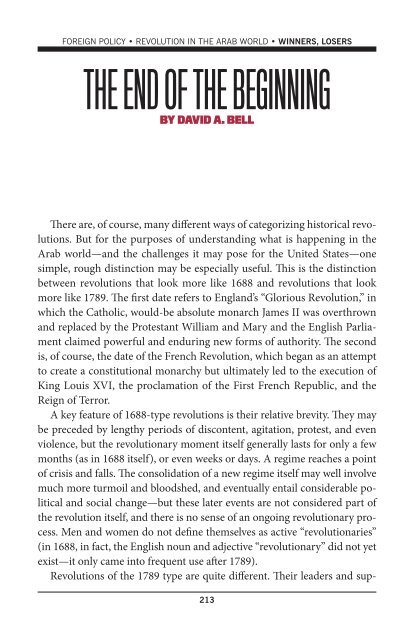Revolution in the Arab World - Observation of a lost soul Blog
Revolution in the Arab World - Observation of a lost soul Blog
Revolution in the Arab World - Observation of a lost soul Blog
You also want an ePaper? Increase the reach of your titles
YUMPU automatically turns print PDFs into web optimized ePapers that Google loves.
foreign policy • revolution <strong>in</strong> <strong>the</strong> arab world • w<strong>in</strong>ners, losers<br />
The End <strong>of</strong> <strong>the</strong> Beg<strong>in</strong>n<strong>in</strong>g<br />
BY DAVID A. BELL<br />
There are, <strong>of</strong> course, many different ways <strong>of</strong> categoriz<strong>in</strong>g historical revolutions.<br />
But for <strong>the</strong> purposes <strong>of</strong> understand<strong>in</strong>g what is happen<strong>in</strong>g <strong>in</strong> <strong>the</strong><br />
<strong>Arab</strong> world—and <strong>the</strong> challenges it may pose for <strong>the</strong> United States—one<br />
simple, rough dist<strong>in</strong>ction may be especially useful. This is <strong>the</strong> dist<strong>in</strong>ction<br />
between revolutions that look more like 1688 and revolutions that look<br />
more like 1789. The first date refers to England’s “Glorious <strong>Revolution</strong>,” <strong>in</strong><br />
which <strong>the</strong> Catholic, would-be absolute monarch James II was overthrown<br />
and replaced by <strong>the</strong> Protestant William and Mary and <strong>the</strong> English Parliament<br />
claimed powerful and endur<strong>in</strong>g new forms <strong>of</strong> authority. The second<br />
is, <strong>of</strong> course, <strong>the</strong> date <strong>of</strong> <strong>the</strong> French <strong>Revolution</strong>, which began as an attempt<br />
to create a constitutional monarchy but ultimately led to <strong>the</strong> execution <strong>of</strong><br />
K<strong>in</strong>g Louis XVI, <strong>the</strong> proclamation <strong>of</strong> <strong>the</strong> First French Republic, and <strong>the</strong><br />
Reign <strong>of</strong> Terror.<br />
A key feature <strong>of</strong> 1688-type revolutions is <strong>the</strong>ir relative brevity. They may<br />
be preceded by lengthy periods <strong>of</strong> discontent, agitation, protest, and even<br />
violence, but <strong>the</strong> revolutionary moment itself generally lasts for only a few<br />
months (as <strong>in</strong> 1688 itself), or even weeks or days. A regime reaches a po<strong>in</strong>t<br />
<strong>of</strong> crisis and falls. The consolidation <strong>of</strong> a new regime itself may well <strong>in</strong>volve<br />
much more turmoil and bloodshed, and eventually entail considerable political<br />
and social change—but <strong>the</strong>se later events are not considered part <strong>of</strong><br />
<strong>the</strong> revolution itself, and <strong>the</strong>re is no sense <strong>of</strong> an ongo<strong>in</strong>g revolutionary process.<br />
Men and women do not def<strong>in</strong>e <strong>the</strong>mselves as active “revolutionaries”<br />
(<strong>in</strong> 1688, <strong>in</strong> fact, <strong>the</strong> English noun and adjective “revolutionary” did not yet<br />
exist—it only came <strong>in</strong>to frequent use after 1789).<br />
<strong>Revolution</strong>s <strong>of</strong> <strong>the</strong> 1789 type are quite different. Their leaders and sup-<br />
213




